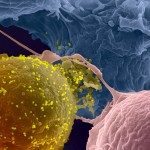Link to Pubmed [PMID] – 27114546
Proc. Natl. Acad. Sci. U.S.A. 2016 Apr;
Viruses often interfere with the DNA damage response to better replicate in their hosts. The human immunodeficiency virus 1 (HIV-1) viral protein R (Vpr) protein has been reported to modulate the activity of the DNA repair structure-specific endonuclease subunit (SLX4) complex and to promote cell cycle arrest. Vpr also interferes with the base-excision repair pathway by antagonizing the uracil DNA glycosylase (Ung2) enzyme. Using an unbiased quantitative proteomic screen, we report that Vpr down-regulates helicase-like transcription factor (HLTF), a DNA translocase involved in the repair of damaged replication forks. Vpr subverts the DDB1-cullin4-associated-factor 1 (DCAF1) adaptor of the Cul4A ubiquitin ligase to trigger proteasomal degradation of HLTF. This event takes place rapidly after Vpr delivery to cells, before and independently of Vpr-mediated G2 arrest. HLTF is degraded in lymphocytic cells and macrophages infected with Vpr-expressing HIV-1. Our results reveal a previously unidentified strategy for HIV-1 to antagonize DNA repair in host cells.

